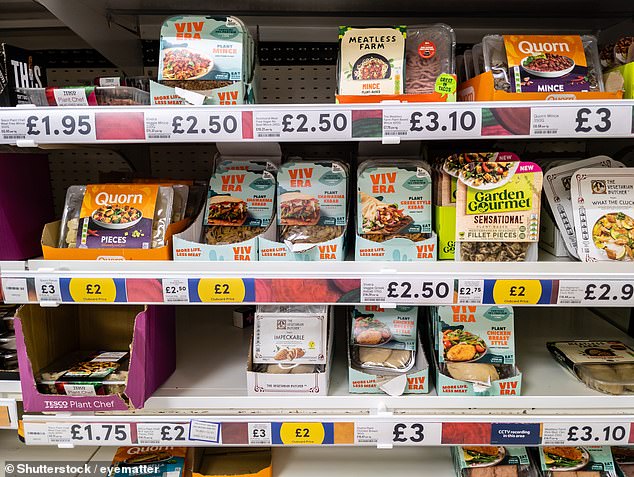- READ MORE: A study implies that vegan imitation meats may be associated with an increased risk of heart-related fatalities.
Individuals aiming to reduce their consumption of meat and dairy products should consider transitioning to beans and peas instead of choosing veggie burgers and plant-based milk, as this approach may offer more benefits. University of Oxford study has found.
When evaluating 24 meat and dairy substitutes, experts examined various aspects such as their effect on health, environmental implications, and pricing.
They discovered that plant-derived foods like peas, soybeans, and beans excelled most comprehensively in all categories.
When compared, processed foods like veggie burgers, soy-based meat substitutes such as tofu and tempeh, along with plant milks showed less positive impact on the environment and came at a higher price point than wholefoods – although these options were still more environmentally friendly than consuming animal products.
At the bottom of the list was lab-grown meat, which has not been approved for human sale in the UK yet.
In the journal Proceedings of the National Academy of Sciences (PNAS), scholars from Oxford and University College have published their findings. London proposed that substituting all meat or dairy products in wealthy nations with alternative options providing equivalent caloric values might reduce premature deaths by approximately 5 percent to 6 percent.
'The most significant decreases among alternative meats were observed in peas at 6.1 percent, followed closely by tempeh, beans, and soybeans ranging from 5.1 percent to 5.7 percent. Veggie burgers and tofu showed declines between 4 percent and 4.3 percent, with veggie sausages and veggie bacon experiencing drops of 3.5 percent to 3.6 percent,' they explained.
'The most significant decreases among plant-based milks were observed in soybeans at 5.2 percent, with almond milk coming second.'

The majority of alterations in the probability of mortality were associated with rises in fiber intake (by 44 percent), beneficial for overall health, trailed by decreases in negative factors like low-density lipoprotein (bad cholesterol) along with increments in advantageous components including healthier fatty acids and the electrolyte potassium.
Research indicated that individuals who substituted their calorie intake from meat or dairy products with alternative options generally consumed less fat and more fiber in their diets.
Regarding the climate impact, experts stated that the livestock industry accounts for most of the greenhouse gases produced by food production and contributes approximately 20 percent of total global greenhouse gas emissions.
'The environmental consequences of our current eating habits will likely create significant obstacles for attempts to limit global temperature rise under 2°C without shifting towards more plant-centric diets. These effects might also surpass critical ecological limits designed to ensure we remain within a sustainable range on our planet’s systems,' they stated.
They added: "Our research indicates that unprocessed plant-based options like soybeans, peas, and legumes are ideal substitutes for meat and dairy products in affluent nations, performing effectively across various criteria."
When compared, processed plant-based options like veggie burgers and plant milks showed fewer climate advantages and higher costs than unprocessed alternatives. However, they still provided significant environmental, health, and nutritional perks when contrasted with animal-derived products.
The group determined that opting for legumes instead of meat and dairy products could cut "dietary imbalances" in wealthy nations such as the UK by 50%, lower early deaths—especially those linked to food-borne illnesses—by 10%, decrease the ecological footprint of eating habits by over half, and slash expenses by more than one-third.
Dr. Marco Springmann, who headed the study from the Environmental Change Institute at Oxford, stated, "It is crucial to decrease consumption of meat and dairy products in wealthy nations to curb climate change, protect biodiversity, and enhance public health."
'Ours is a study indicating that numerous types of foods and edible items can offer several advantages upon substituting for meat and dairy in present dietary habits.'
Read more